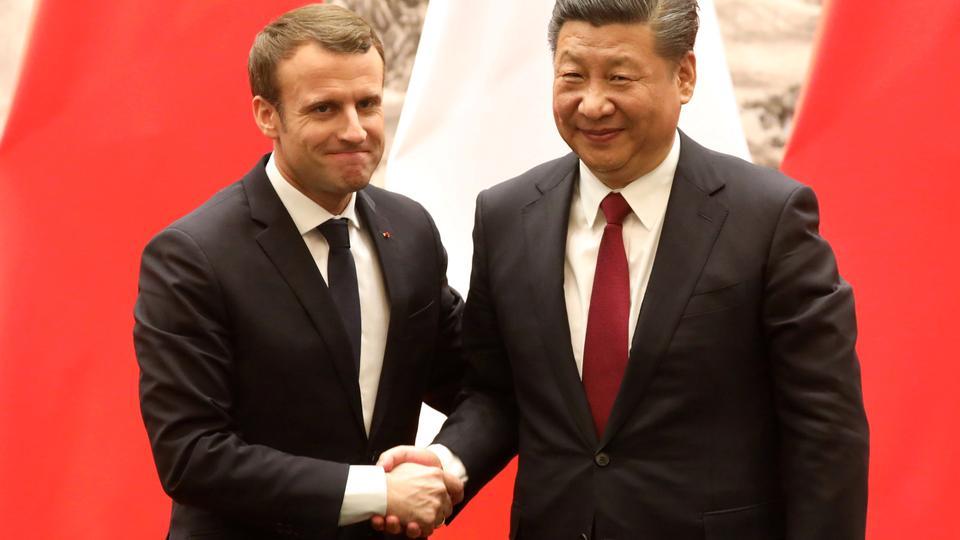By Jeff Ferry, CPA Chief Economist
According to rumors circulating in Paris, French president Emmanuel Macron recently had a phone call with Chinese president Xi Jinping in which the Frenchman asked for an emergency shipment of a billion face masks to cope with the COVID crisis. The Chinese president is said to have replied: “We will give them to you if you deploy 5G networks with Huawei.”
The story has not been confirmed by Macron’s people. (You can read the gossip in French here.) But it illustrates two important economic trends quietly gathering force: on the one hand, nations are increasingly looking at ways to reduce their dependence on Chinese imports and attain a greater level of self-reliance. Meanwhile, inside China, influential Chinese officials and businesspeople are recognizing the clout they can gain worldwide through domination of health care industries and are urging their colleagues to continue and even expand this policy.
In Japan, prime minister Shinzo Abe has reacted strongly to the shortages of parts from China that held back production of Japanese products like automobiles early in the COVID crisis. According to Nikkei, Abe told a Japanese government council in early March: “We should try to relocate high added value items to Japan. And for everything else, we should diversify to countries like those in ASEAN.” ASEAN is the association of Southeast Asian Nations.
Nikkei interpreted the comments as suggesting that Japan is likely to move away from its “China plus one” policy under which its large multinationals produced in China but tried to maintain an alternative location. The new policy will be a permanent shift away from China. The Japanese emergency economic package of April 7th includes a sizeable allocation of public funding, 240 billion yen ($2.2 billion), to help Japanese companies move production facilities out of China.
Meanwhile, in France, Finance Minister Bruno Le Maire said in a TV interview that France had to learn the lessons of the coronavirus epidemic for “globalization and especially for supply chains.” The nation, he said, must “reinforce our sovereignty and the strategic supply chains and reduce our dependence on certain great powers. In particular on China and the supply of certain products.”
In France, sale of the generic version of Tylenol has been rationed since March 18th, to one bottle per patient or two in the case of severe pain. Internet sales of the painkiller (known in France by its generic name, paracetamol) are completely banned. The product is made in China.
Finance Minister Le Maire cited pharmaceuticals, the automotive sector, and aerospace as three economic sectors where France needs to reassert sovereignty, i.e. make more products in France. He also told the TV interviewer that it was unacceptable for France to rely on China and South Korea for 80 percent of its electric battery supply, praising a new France-based battery-making facility that would come onstream in 2022. He praised French drugmaker Sanofi for saying recently that it intends to “re-localize” some of its production back to France. “We can’t have, as we do today, 80 percent of the active pharmaceutical ingredients in drugs purchased abroad, of which 40 percent come from China,” Le Maire said.
A recent Chinese success in France was the decision by Huawei to build its first factory outside China there, announced in February. This factory, to make 5G radio antennas and other parts, is expected to employ some 500 people and generate one billion euros in revenue. This commitment is clearly linked to the recent decision by the French government to allow its numbers two and three wireless telecom companies (SFR and Bouygues) to buy Huawei 5G gear, but only for the edge of their networks and not for the more sensitive core.
Like many western governments, the Macron regime is trying to have its Chinese cake and eat it too: befriend China to win business and jobs, but at the same time find a way to avoid becoming over-dependent on the ruthless Communist regime.
And For the USA?
And what does all this mean for the US? The first point to recognize is that if China is increasingly blocked from markets like Japan or France, it will redouble its efforts to sell into the US, using even more huge Chinese government subsidies to undersell US business. That makes it imperative that we too seize the opportunity to bring our supply chains back home, or where that is not immediately possible, move them to third countries. Our success in cutting Chinese imports by 16 percent in 2019 and rapidly opening production sites in Southeast Asia and elsewhere show that US manufacturers can relocate more quickly than many in Washington had ever thought possible.
But so far the political will has not been much in evidence. Other than some vague comments by Trump advisor Larry Kudlow, the administration has said little about reconfiguring supply chains or bringing production back home. It may be that Chinese leaders are right when they say that once the crisis is past, large western multinationals will still be guided by cost rather than by the needs of national security or the domestic economy. The CPA recently compiled and handed over to the White House a list of over 600 US companies willing and able to help make medical supplies today, yet few of them have been contacted, while the large multinationals making ventilators continue to use suppliers in Asia.
Our leaders must realize that globalization is rapidly falling out of fashion. In Japan they now talk about “han-kokusai,” Japanese for de-globalization. In France they call it “demondialisation” or “relocalisation.” Harvard Business School professor Willy Shih calls it “regionalization” and points out that Toyota—probably the world’s most admired manufacturer—has always believed that its suppliers should be close to its assembly plants.
We must all learn from this awful pandemic. America must be strong and self-reliant enough to take care of its own people when they are ill and control our own economic destiny in peacetime. And in wartime.













